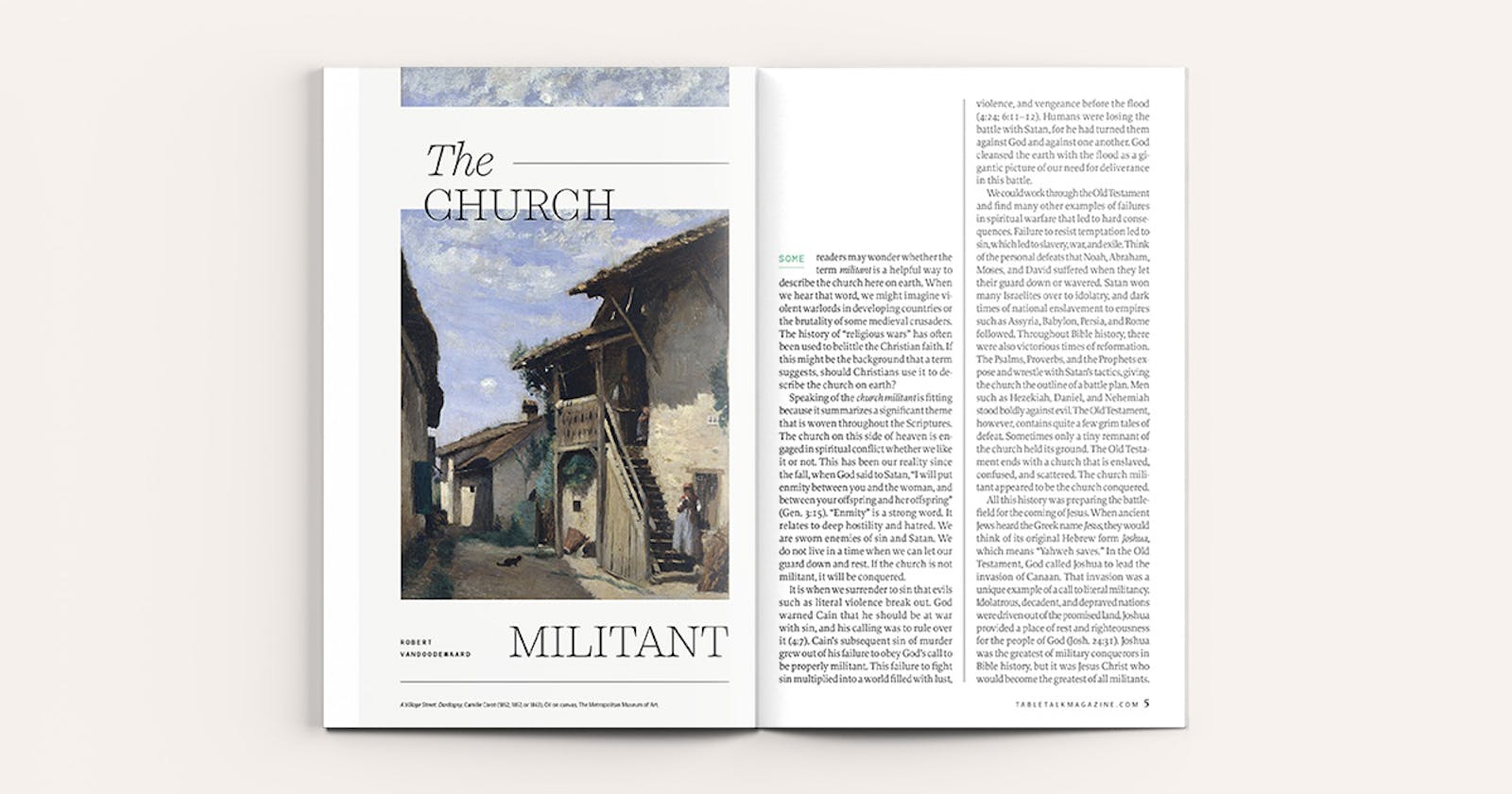
Request your free, three-month trial to Tabletalk magazine. You’ll receive the print issue monthly and gain immediate digital access to decades of archives. This trial is risk-free. No credit card required.
Try Tabletalk NowAlready receive Tabletalk magazine every month?
Verify your email address to gain unlimited access.
Some readers may wonder whether the term militant is a helpful way to describe the church here on earth. When we hear that word, we might imagine violent warlords in developing countries or the brutality of some medieval crusaders. The history of “religious wars” has often been used to belittle the Christian faith. If this might be the background that a term suggests, should Christians use it to describe the church on earth?
Speaking of the church militant is fitting because it summarizes a significant theme that is woven throughout the Scriptures. The church on this side of heaven is engaged in spiritual conflict whether we like it or not. This has been our reality since the fall, when God said to Satan, “I will put enmity between you and the woman, and between your offspring and her offspring” (Gen. 3:15). “Enmity” is a strong word. It relates to deep hostility and hatred. We are sworn enemies of sin and Satan. We do not live in a time when we can let our guard down and rest. If the church is not militant, it will be conquered.
It is when we surrender to sin that evils such as literal violence break out. God warned Cain that he should be at war with sin, and his calling was to rule over it (Gen. 4:7). Cain’s subsequent sin of murder grew out of his failure to obey God’s call to be properly militant. This failure to fight sin multiplied into a world filled with lust, violence, and vengeance before the flood (Gen. 4:24; 6:11–12). Humans were losing the battle with Satan, for he had turned them against God and against one another. God cleansed the earth with the flood as a gigantic picture of our need for deliverance in this battle.
We could work through the Old Testament and find many other examples of failures in spiritual warfare that led to hard consequences. Failure to resist temptation led to sin, which led to slavery, war, and exile. Think of the personal defeats that Noah, Abraham, Moses, and David suffered when they let their guard down or wavered. Satan won many Israelites over to idolatry, and dark times of national enslavement to empires such as Assyria, Babylon, Persia, and Rome followed. Throughout Bible history, there were also victorious times of reformation. The Psalms, Proverbs, and the Prophets expose and wrestle with Satan’s tactics, giving the church the outline of a battle plan. Men such as Hezekiah, Daniel, and Nehemiah stood boldly against evil. The Old Testament, however, contains quite a few grim tales of defeat. Sometimes only a tiny remnant of the church held its ground. The Old Testament ends with a church that is enslaved, confused, and scattered. The church militant appeared to be the church conquered.
All this history was preparing the battlefield for the coming of Jesus. When ancient Jews heard the Greek name Jesus, they would think of its original Hebrew form Joshua, which means “Yahweh saves.” In the Old Testament, God called Joshua to lead the invasion of Canaan. That invasion was a unique example of a call to literal militancy. Idolatrous, decadent, and depraved nations were driven out of the promised land. Joshua provided a place of rest and righteousness for the people of God (Josh. 24:31). Joshua was the greatest of military conquerors in Bible history, but it was Jesus Christ who would become the greatest of all militants.
The life and ministry of Jesus are the ultimate example of resistance against and victory over Satan. Though Satan tempted Him in the wilderness with a series of shortcuts, Jesus chose the narrow way of suffering as the path to ultimate victory (Matt. 4:4, 7, 10). His gospel campaign took Him throughout the entire land, confronting every semblance of sin, evil, sickness, and curse. He taught righteousness and confronted false teachers. He brought the message of the law in all its power (chs. 5–7). He called for repentance and faith. His ministry of reconciliation ushered in a new era of victory for the church.
When Jesus’ disciples returned from a gospel mission, they came with joy, recounting stories of victory. The Lord Jesus responded to them: “I saw Satan fall like lightning from heaven. Behold, I have given you authority to tread on serpents and scorpions, and over all the power of the enemy, and nothing shall hurt you” (Luke 10:18–19). Christ came into this world to lead an invasion, and the effect of His work was to topple Satan, the former ruler of this world. He established the kingdom of God with power. Since His victory, the good news of His finished work has been going to the ends of the world. Through the preaching of His Word, strongholds are cast down, captives are freed, and many are added to His army.
It is important to realize that the militant power of Christ was not rooted in His ability to influence or His physical prowess. It was rooted in His perfect submission to the will of the Father. Our history is a story of mankind fighting God by trying to be like God (Gen. 3:5), reaching the heavens (Gen. 11:4), or trying to make up gods of our liking (Ex. 32:4). In a complete reversal, the Son of God “emptied himself, by taking the form of a servant, being born in the likeness of men. And being found in human form, he humbled himself by becoming obedient to the point of death, even death on a cross” (Phil. 2:7–8). The warfare of Christ was, and is, a most profound contrast with the warfare of this world. He was perfectly righteous. He willingly faced suffering without bitterness. He laid down His life for sinners. Through this profound obedience, He achieved victory over sin, death, and the devil. He was and is the very opposite of Cain. Having conquered, He is the rightful and victorious ruler over all things.
Therefore God has highly exalted him and bestowed on him the name that is above every name, so that at the name of Jesus every knee should bow, in heaven and on earth and under the earth, and every tongue confess that Jesus Christ is Lord, to the glory of God the Father. (Phil. 2:9–11)
Though we are the church militant, we must never forget that Jesus has already conquered on our behalf. The Lord Jesus Christ faced death, but it could not hold Him down. The curse could not keep Him in the grave because He is perfectly righteous (Acts 2:24). We are merely fighting in the last skirmishes of His great spiritual war. Our Lord has driven Satan from his former place, and He will soon push him into the abyss forever. Satan may still be a dangerous enemy (1 Peter 5:8), but he has suffered a crippling deathblow. There is reason to be sober and vigilant, yet there is nothing to fear. Victory is already in hand.
Now the redeemed church is called to follow in the righteous footsteps of its Captain. We are called to “fight the good fight of the faith” (1 Tim. 6:12). We are to “abstain from fleshly lusts which war against the soul” (1 Peter 2:11, NKJV). We are to put on the whole armor of God (Eph. 6:10–20). We are reminded that “the weapons of our warfare are not of the flesh but have divine power to destroy strongholds” (2 Cor. 10:4). The book of Revelation closes the canon of Scripture by painting a picture of a church at war, sometimes seemingly defeated, yet always victorious in Christ. When we trace this theme through Scripture, we realize that we ought to see the church on this earth as militant. It is a vital part of the fabric of Scripture, woven through from Genesis to Revelation.

It is one thing, however, to be convinced from Scripture that we are the church militant and yet another for this theme to shape us. Beyond our identity in Christ and His victory, what does it mean to exist as the church militant?
The church militant will accept that we are at war with sin, the world, and Satan. If the church is to thrive, we cannot be walking in lockstep with the world. Are we marching with the world? Or are we perhaps just a bit more conservative, but following a few decades behind? We are called to be militant pilgrims and strangers on this earth (1 Peter 2:11). In our struggle against sin, we ought to resist to the point of “shedding blood” (Heb. 12:4). The true church militant will be boldly countercultural in doctrine, practice, and love.
The church militant must learn that it is often our calling to suffer. Being a soldier is not easy. It means looking death in the eye. It may even be our calling to fight while being weakened by “a thorn . . . in the flesh”—that is, “a messenger of Satan” (2 Cor. 12:7). The Christian soldier is called to battle sickness, weakness, insults, hardships, persecutions, and calamities. While our world does all it can to avoid suffering, let us be glad in our state of weakness, so that the power of Christ may rest on us (2 Cor. 12:8–10). It is often the worst of times that are the best of times for Christ’s beloved. Satan’s attacks, suffering, and persecution serve only to highlight the beauty and power of Christ’s love. “In all these things we are more than conquerors through him who loved us” (Rom. 8:37).
The church militant will also be vigilantly defensive. We are called to be sober-minded and watchful (1 Peter 5:8). We need to look out for enemy infiltrators who appear to be godly but, in reality, are lovers of pleasure. Satan’s double agents have been sneaking into churches and Christian households for thousands of years (2 Tim. 3:6; Jude 4). There are those who, by force of personality or lies, will seek to pit Christians against one another. Sadly, there will be divisions even in the visible church (1 Cor. 11:18). In our time, falsehoods creep easily into churches and homes through the internet, entertainment, and books. A main part of watchfulness is prayerfulness. Are we prayerful about discerning what influences are assailing the church and her children? Are we willing to defend her at great cost?
Finally, the church militant must always be on the offensive. No sport is won without offense, and the same is true for battles. Offense does not mean taking up literal weapons or picking foolish fights, but it means boldly handling the Word of God, which is our main weapon (Eph. 6:17; Heb. 2:12). The militant church must preach, pray, and sing from God’s Word boldly. Faithful use of the Word of truth will expose and destroy the lies of Satan. It will call sinners to repentance and faith and usher them into submission to the King of kings. Even when it comes from the mouths of babes, the Word of God is used to “still the enemy and the avenger” (Ps. 8:2).
The concept of the church militant is more than just traditional. It is a vital theme that helps us focus on our identity in Christ and our calling to serve Him with boldness. It helps us live in expectation of trials. It teaches us that we need to be aligned in spiritual warfare with a mighty company of saints from around the world. Christ’s church will march on. Let us march, too, with confidence that our King is almighty (Rev. 19:11–16).
